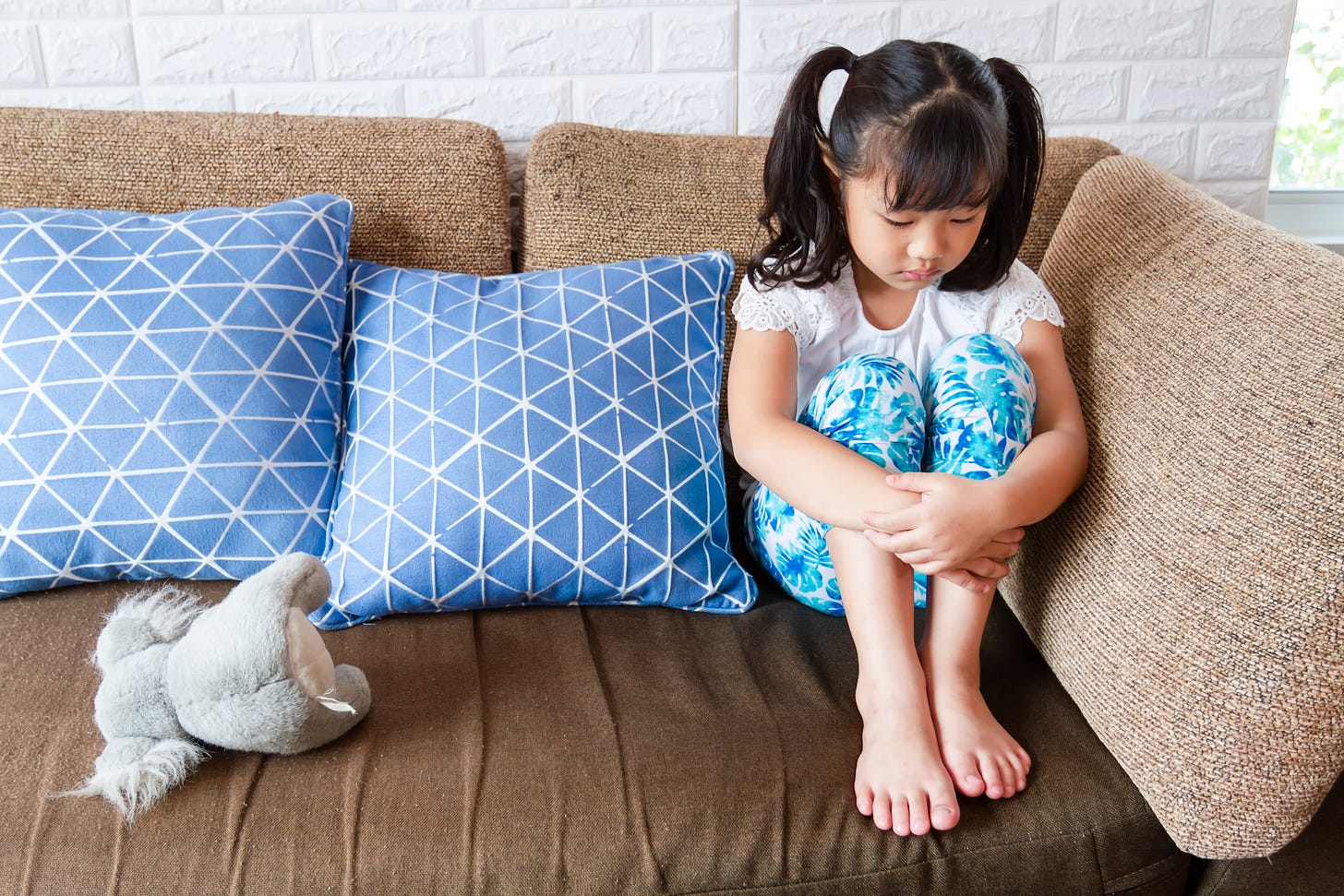INSPIRED in Health and Safety
Read ArticleAugust 3, 2021
When kids feel socially anxious
How to support kids who are struggling with the return to normal (and maybe the return to school).
by Melinda Wenner Moyer
This week, I’m going to address an issue that one of my own children has been grappling with: social anxiety. My 7-year-old has a lovely group of friends, and she’s confident and outgoing when she feels comfortable. But this summer, as we have opened back up and she has begun seeing friends she hasn’t seen in a while, she has really struggled, and I worry that the transition back to school in a few weeks will be especially hard.
Earlier this summer, for instance, we invited a family over for dinner that we hadn’t spent time with in over a year. In the days leading up to it, my daughter began making increasingly difficult demands. One day it was, We need to make cookies for the playdate! The next day: We need to get balloons for the playdate! And finally: We have to decorate the entire house for the playdate! When I told her we couldn’t do all the things, she had a huge meltdown — and later, after she had calmed down, I sat down and talked with her about why she was making so many requests. Her explanation was heartbreaking. “I’m scared that Alice doesn’t like me anymore, so I want to do everything I can to win her back,” she explained.
When kids are having a hard time, how can parents best support them? Here are some insights I’ve gleaned from experts.
- Keep in mind that it’s perfectly reasonable for kids to feel anxious now.
Kids may be feeling worried for all sorts of reasons. Like my daughter, they may be concerned they’ve lost friends they haven’t seen in a while. They’re also seeing more people, and are doing more things, than they have in a while — it’s a lot of change and stimulation over a short period of time, which can feel overwhelming. (And if you’re taking more precautions again now because of the Delta variant, your kids may be confused and worried by that shift, too.) My daughter attended a birthday party last weekend for the first time in a while, and she didn’t know most of the kids there because of our school situation last year. She felt extremely anxious the entire time — to the point where she had a huge meltdown right before the cake was served, which then made her feel embarrassed, which then led to another meltdown.
If your kids are young, they might not even remember what life was like in the Before Times. The 4-year-old of a friend of mine recently asked what a restaurant was, because he had no memory of having ever gone to one before the pandemic. For little kids, the changes that have happened this summer, and will continue to happen this fall, make them feel like they are stepping into an entirely new world. When I spoke with child psychologist Rebecca Schrag Hershberg for a story I wrote for the Washington Post, she put it this way: Compared with who they were before the pandemic, little children right now “are facing the world as completely different people.” It’s no wonder some of them are freaking out.
- Know that anxiety can manifest in kids in various ways.
Anxiety is one of those beasts that rears its head differently depending on the child. When anxious, some kids may become more controlling: They need to be wearing the exact right thing when usually they couldn’t care less about their clothes; they scream bloody murder when you have the gall to cut up their apple instead of serving it whole. When my now 10-year-old son used to feel anxious, he would demand to brush his teeth before anyone else in the morning, because it was one of the few things he could control. When kids feel out of sorts, they hunt for ways to exert their dominance, and it can come out in the strangest of ways.
Other kids may show their anxiety by being irritable or clingy, or by having nightmares or not sleeping well. I can always tell when my daughter’s anxiety has ramped up, because she calls for me at least twice after I say night night. Other kids may struggle with everyday choices, Hershberg said, like deciding what to eat for breakfast. They may also regress, or start doing things that they used to do that you thought they had grown out of. (For more on regression, what it looks like and what it means, check out this story I wrote about it for The New York Times.)
- To support your kids, validate their feelings, talk through upcoming plans, and ease up on optional activities if they seem overwhelmed.
It can be hard to empathize with kids when they get extremely upset over seemingly small things. But remember that kids have a much harder time managing emotions than adults do, and that sometimes they just need to let big feelings out. Try to convey to them that it’s OK for them to be upset or scared, and that you’re there for them. Say something like “This is really hard,” or “This is feeling like a lot, isn’t it?” Resist the temptation to belittle their feelings or to tell your kids they’re overreacting. Research suggests that these kinds of insensitive responses can actually make kids more anxious. (If your child has developed a phobia, read this piece I wrote for The New York Times on helping them overcome it.)
If your kid seems stressed about an upcoming social situation (or something else scary like a doctor’s appointment), try to walk them through what might happen and when. First, we’ll arrive at the party, and you’ll give your friend your present. Then, you’ll probably play in the pool for a while, and maybe you’ll play some games. Then everyone will get out and have lunch and birthday cake. One thing I’ve found really helpful is to ask my kids to describe the worst-case scenario, and then to respond with something like Well, even if that happens, you know what? You’ll get through it. And then we’ll go home, and have dinner together like we usually do.
If you’re with your child during moments of stress, offer her support in the moment, too. Hold her hand or stay by her side if she’s feeling nervous. As Vanessa LoBue, a psychologist at Rutgers University, explained to me for a piece I wrote for The New York Times on supporting shy kids, you want to convey to your child that “I’m going to be this secure base for you — I’m going to be there and help you because I understand that you’re feeling nervous.”
Be sensitive, too, to the fact that your child might need to ease into new activities slowly. So before signing your kid up for 800 fall extracurriculars, check in to see what they feel ready for. To help with things they have no control over — school is going to start even if your kid isn’t ready for it — brainstorm ways to ease your child back in. Perhaps you set up a few outdoor playdates in the weeks leading up to the first day of school so your kid can re-connect with their old buddies and feel more comfortable. Give your kid a picture of you to take with her to school on the first day so that she can sneak a peek when she’s feeling overwhelmed.
If you want additional support, I recommend checking out psychologist Tamar Chansky’s book Freeing Your Child From Anxiety. Based on a recommendation from a psychologist, I also recently purchased the workbook Coping Cat, which is designed for therapists, and uses the principles of cognitive behavioral therapy (CBT) to help anxious kids, but it can be used by parents too. I’ve started working on it with my daughter, and she’s been enjoying it. If you’re at your wit’s end, talk to your pediatrician and ask for a referral to a child or family therapist.




